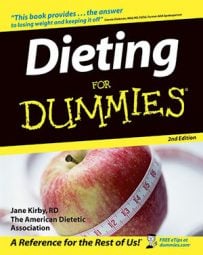Dieting researchers have found that people with a long history of dieting lose their ability to recognize when they are full after a nutritionally complete meal. Chronic dieters eat or don’t eat based only on outside influences such as time of day, thoughts, and beliefs . . . not on what their bodies are actually telling them.
On a biochemical level, excessive dieting may trigger the lepin-ghrelin mechanism that is nature’s way of ensuring that you stay well fed. Your body is programmed to survive. Humans have an infinite capacity to store fat, which in times of famine comes in handy.
When you go on a severe calorie-restricted diet, your body reacts by hoarding the calories that you give it. People who are always on a diet exhibit psychological behaviors similar to those of people who are starving in prison camps.
A landmark study done during World War II shows how similar the effects of dieting and starving are. Normal-weight men who were conscientious objectors to the war were asked to restrict their eating for 6 months to lose about 25 percent of their body weight so that the effects of starvation could be studied. The men reduced their normal intake by about 25 percent; if they stopped losing weight, their intake was restricted even more.
While they were being starved, they became increasingly focused on food; they collected recipes and replaced pinup pictures of women with pictures of food. They were irritable, upset, and argumentative. They became apathetic and lethargic. When they were allowed to regain their weight, they gorged themselves and continued to be obsessed with food.
If you’re a chronic dieter, you may be at risk of developing the same psychological characteristics of people who are starving: a tendency to eat excessively, to become overly emotional, to have trouble concentrating, and to obsess about food and eating. How you answer the following question is a good indication of whether you’re dieting too much: What would you do if the scale showed an extra five pounds?
If you’re a dieter, you’d probably overeat. That’s what researchers at the University of Toronto, Ontario, Canada, found when they weighed dieters and nondieters and told them that they weighed 5 pounds heavier or 5 pounds lighter than their actual weights. Dieters who believed that they were heavier experienced lowered self-worth that led them to overindulge in food. Nondieters and dieters who were told that they weighed 5 pounds less weren’t affected by the false weight feedback.
To get over overeating, you need to start listening to your body. One way to prepare to hear what your body is telling you is to plan your meals and snacks. Many overweight people eat chaotically and in response to outside cues (advertising) and sensual cues (the smell of food). In addition, they often use food to tame emotions. Knowing what you’re going to eat, and when and where you’ll eat puts order to your diet.

